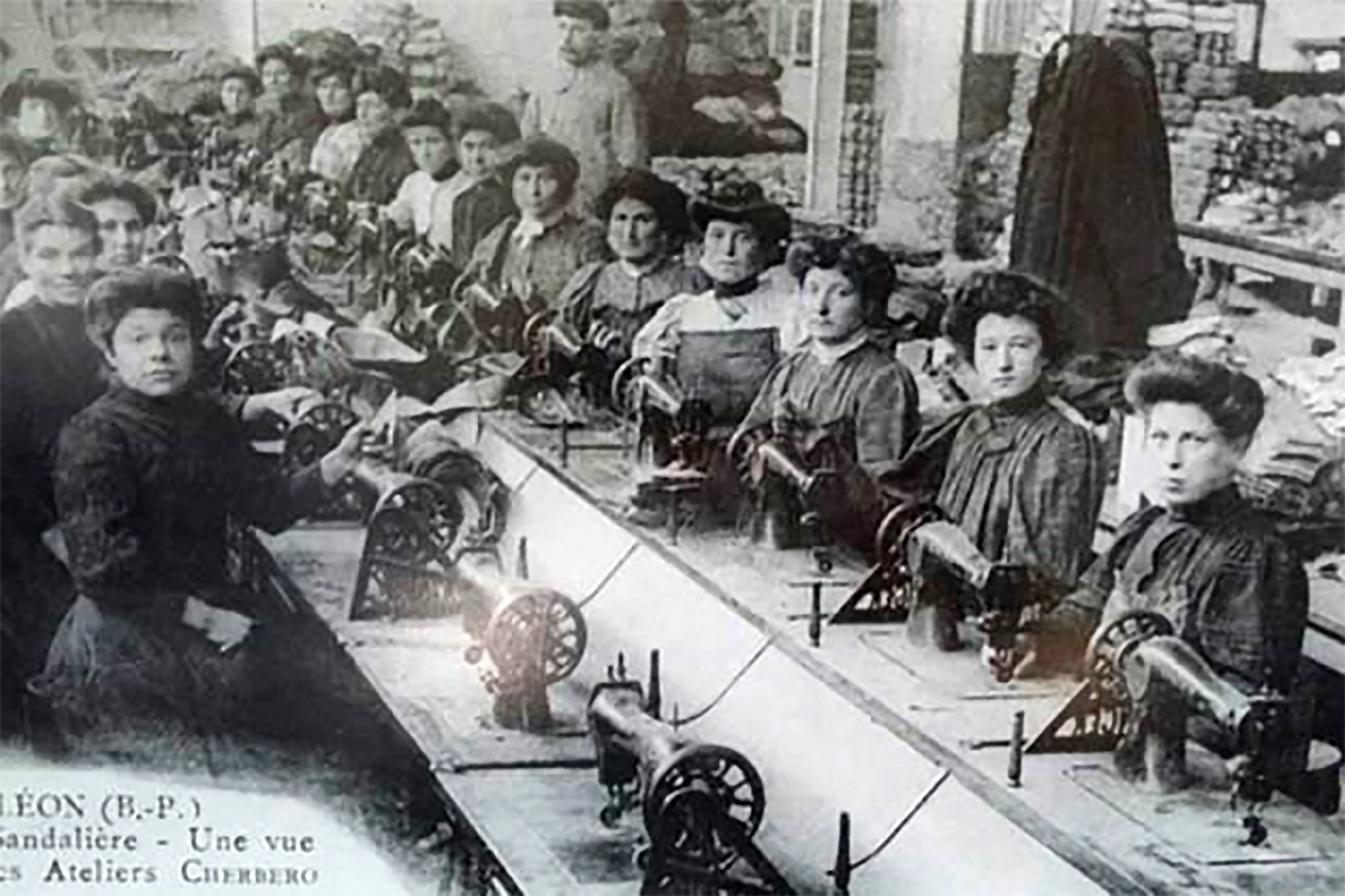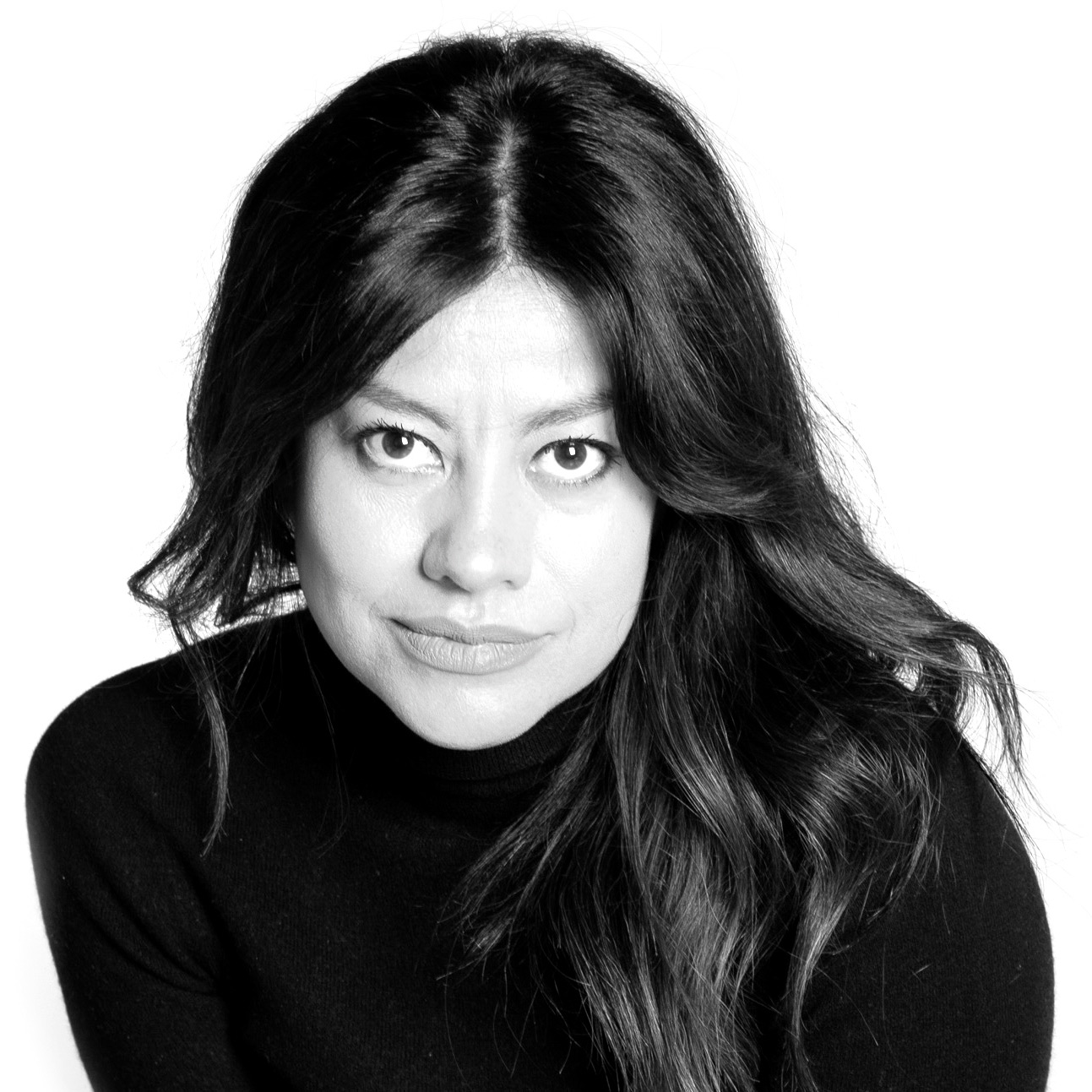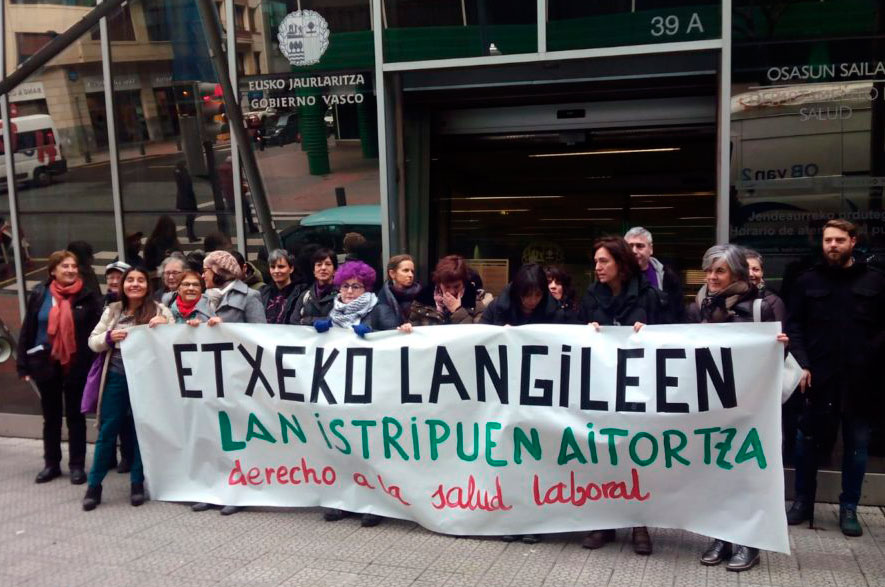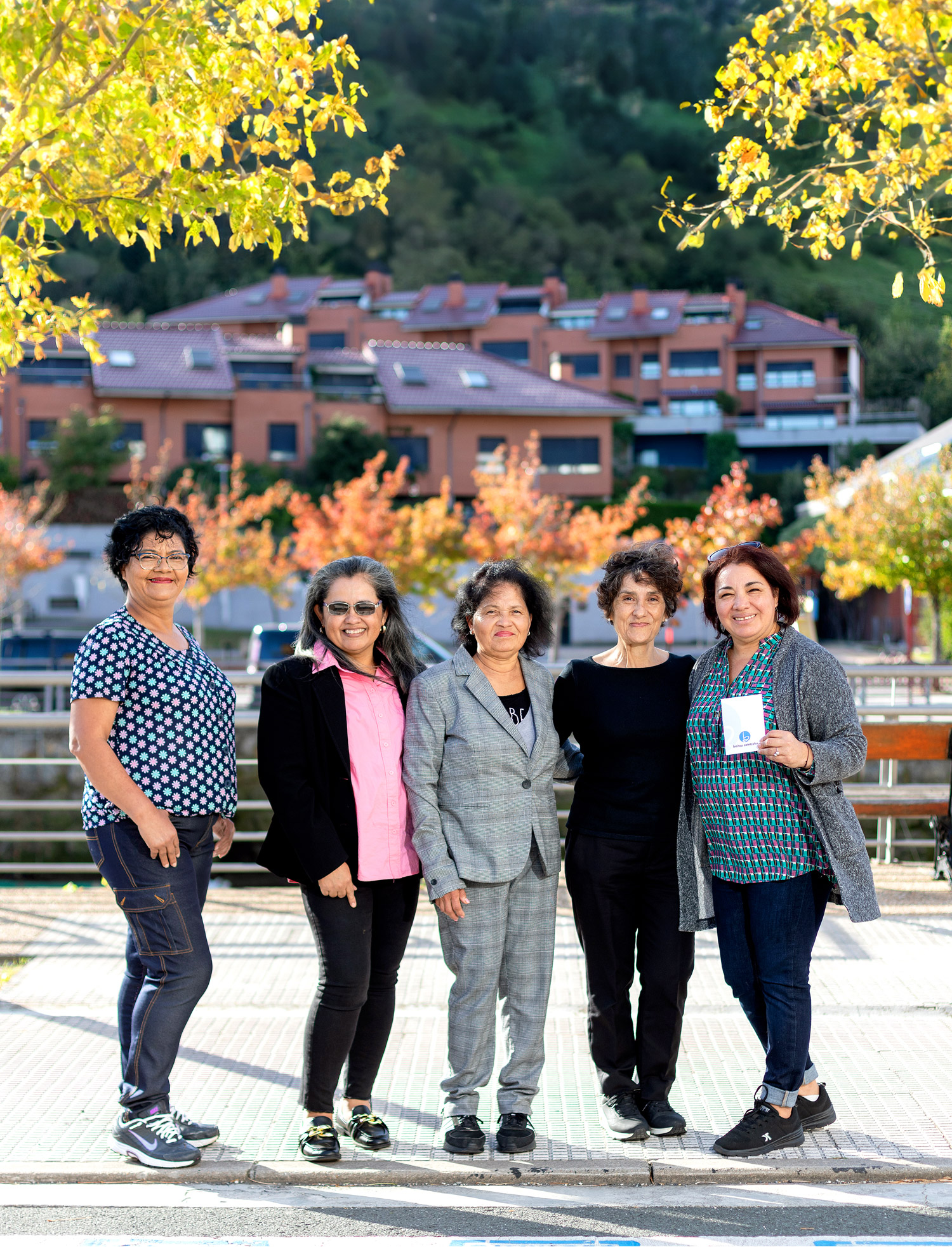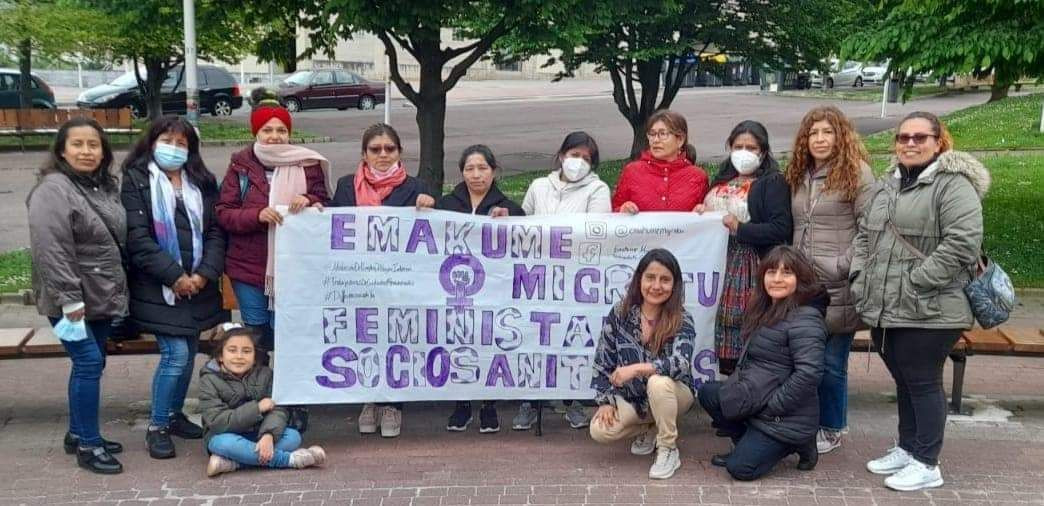"I feel privileged, but I've had to work a lot."
- I had spent sixteen years without Christmas here. Because Australia is always far away. However, the work gave him the opportunity to reach Euskal Herria at the end of last year, and in Lazkao we had the opportunity to enjoy this year’s festivities. It tells us about the steep roads through which the here and there have passed, as I would go back.

Erika González García. Lazkao, 1979
Translator and interpreter. He was a professor of Translation and Interpretation at the UPV/EHU until in 2006 he joined Australia to delve into Social Interpretation. He graduated from Sydney and is an associate professor at RMIT University in Melbourne and director of the translation area. Continue to be freelance translator and interpreter. He was president of the Australian Association of Translators and Interpreters between 2019 and 2022 and is currently on his board. It works in various advisory groups of the Australian Government, such as those of the Ministry of Interior and Health.
This year you have spent Christmas in your hometown...
Last, in 2005, I spent Christmas in Euskal Herria. But I have not spent sixteen years without coming home! I've come here every two years. You can't come every year because the flight is huge and expensive, and even more expensive when kids have reached the age of paying the full fare. At Christmas, moreover, flights are more expensive, and instead of coming we parents used to go to Australia in the summer season. And besides, Christmas there is easier, it becomes much less party and the days we spend quiet on the beach, without so many dinners of food! But this last year I've been twice! One in summer and one in Christmas. I am one of the interpreters who attend meetings of the Antarctic Treaty and when meetings are held in Europe I have the excuse of working to come and visit the people. Meetings of the Pact were held in Helsinki last year.
The ones there, the ones here -- you always relate.
Yes. This has been the case for all these years, except during the pandemic. It was very hard because the country was tightly closed. Nobody could come in or out. Or if it was taken out, special documentation signed by the government was needed. For example, we had a neighbor from Germany with a sick mother. He asked twice for permission to go to Germany. They denied him. In the end, when they gave her permission, her mother was dead. At that time of the pandemic, if you left Australia, you had to leave three months. The years 2020 and 2021 were very hard.
Here was an Australian town or city that detected a case of virus and ordered total isolation from the entire population.
They did it in the city of Perth. We live in harsh isolation in Australia. I have friends in Buenos Aires, and it was the city that had been in isolation for the most days. Soon, Melbourne went ahead. We lived there, and in the streets we had police and military patrolling, and then, when we were given permission to go out by couples, we were seen on the street as policemen and panicked a kind of panic. For those who come from territories that have suffered genuine police repression, it was tough. For many refugees and immigrants, it was difficult to come to Australia in search of peace and see a police presence on the street… It was a very demanding closure, although the main challenge of the Victoria State government was to keep everyone healthy and alive.
How have you invented adapting to the environment and life of Australia?
We're all different. We're seeing that we've grown up and educated, and I think that place leads us to see the world in a certain way. The Australian, however, is not a unique culture, but several cultures coexist in it. Nor can we forget that indigenous Aborigines have been on the continent for 60,000 years and that their cultures and traditions are present. Australia has been a territory marked by racism. We have a saying in English: “White Australia has a black past.” Today, although we have a multicultural and rich nation, and there is good social cohesion in general, it has not always been that way. At the same time, there are still major problems to overcome.
"Sidney's were tough years, without the support of grandparents and the family living here. Thank you to the tribe!"
What a problem?
Last year, for example, the government organized the referendum The Voice, calling for constitutional change so that native Aborigines and the islands of the Torres Coast had a parliamentary voice. It was negative. It was interesting to note that most non-governmental organizations and organizations working with immigrants were in favour of the yes, but most of society refused. I believe that our relationship with the local First Nations should be better promoted and channelled. In this kind of diversity, the corners are many, also big, and in the end you get used to that bunch of differences. & '97; I believe that in these situations it is up to us to unfold our head, heart and soul, to see how others do things, to take them into consideration and often laugh, as they do when they see us. I think humans are very tribal.
Not only the Basques, therefore.
Let me tell you. Our daughter goes to the public school in the neighborhood and in the group of mothers we have Sara, Galeskoa, who speaks to the children of Welsh, to Rina, daughter of South Africans of Indian origin, raised and educated in England, to Nazli, Turkish, to Suzie, Australian, sole native, to Pavine, English, of Indian origin... That's our maternal group, and the truth is, we got very good. However, my best friend is Maite Gorrotxategi, Duranguesa.
Man says tribal, it looks like so many Basques.
Another group of mothers is that of fathers and mothers who transfer the children to Spanish classes. The Spanish Ministry of Education offers free classes in Spanish to the children of immigrants, and we met there. One is that of Cáceres, another is that of Madrid, another is that of Barcelona, one of the Canary Islands, one of Galicia, and that of Maite and I of Durango we are also… We are of the same age, we have many things in common and at the end you join your tribes, make a pleasant life, or try it.
.jpg)
How was that principle, your entry into the Australian environment?
I would say that my first days were very good, because I came from Euskal Herria and I got to Sidney's Etxea. The Basque Country Etxea has a superior room in which the person who lives it works as a free caregiver. For example, when you do Sunday food, help in the kitchen, take care of cleaning, take care of the house. I came to the Basque Country and suddenly it seemed to me to inherit a dozen grandmothers: Carlos Orue and my wife, Look, the Biscayan, came to search the airport. The then president of the Basque Country etxea, Carlos. I remember at the airport, Look at me: “Alabatxi…!” It almost went home.
When do we have accounts?
2006. I left in August of that year, while teaching at the UPV. Three years earlier, I started giving translation classes, I was a young professor. However, I had a vital experience, because it opened my eyes in a way. I was an interpreter, I started working as a translator and interpreter in the Spanish Senate and elsewhere. I was once called from Irun to go to the Spanish police headquarters.
Look!
Yes. They caught a Nigerian who spoke English and asked me to be an interpreter. “Easy work!” I thought. By then I'd already been a conversation interpreter, and that's what I thought. “It will be easy!” But then I realized that that kind of interpretation was completely different. There were no rules, no ethical codes, nothing! Because that work I did as best as I could, and then I got to start working hard, I decided to reflect on social interpretation.
For Irun's case, you mean?
Yes. I realized that, in the cases of Basque and Spanish, we always had linguistic rights, but in the case of migrants, what linguistic rights did they have? What interpretative right was that? In the case of the Chinese, they called the chef of the restaurant in front! Or the selling carpet, in the case of other languages. I, for my part, had studied a bachelor's degree in Soria, on the campus of the University of Valladolid, had solid theoretical bases on interpretation, and then I started researching social interpretation, making tesina, presenting it and then making the thesis, going to Canada, to Ottawa. And the cold! I froze my ear once waiting for the bus. “If I come back somewhere, at least to the heat,” I said.
"You have to try eleven times more than the locals, work harder to prove you're capable. If you're late, you'll be on the right! And how many times have we had to listen to immigrants? 'You have no local experience!'
But how did it get to the heat of Australia?
There are social interpretation congresses, The Critical Link, Interpreters in the Community, and I went to Stockholm to find out what those who are worried about social interpretation are doing in the world. There I met an Australian teacher, Sandra Hale, and I made the relationship. Sandra is a 14-year-old Argentine who travels to Australia. He's a prolific and very generous researcher with me. She helped me, she offered me bibliography, etc. I went back to work at the UPV and once I was in the Vitoria office, Sandra's e-mail. Receiving her message was not surprising, as we were in touch, but in that message she told me about the call for a scholarship to go to Australia to make a stay of between four months and a year.
So did you come to that scholarship?
Yes. I prepared a research proposal and sent it. A very elaborate proposal, I think very good. It was fourteen scholarships, and I stayed in the fifteenth. English was my third language, and I was competing with people who worked in science, in medicine -- in different disciplines, with a lot of people from Scandinavia, with researchers from the UK, Germany, Italy -- and that's the fifteenth! So no. And I kept working at the UPV, at the Faculty of Letters in Vitoria. And one day a message from the Australian Government. That a scholarship student manifested a disability, quit the scholarship and had a choice. “Would you like to come?”
Awkward!
Yes, then! I was the first to receive that scholarship in the Spanish state. And I asked for a four-month leave at the UPV and went to Sydney. They named me a tutor or mentor there, and he called me to stay for a year. I talked to the UPV and asked for a sabbatical year, an unpaid leave all year round. For seven months I lived in the Basque Country, but the need to be on Sundays was also a link and wanted to travel. So I went to live with a German partner. I was also an interpreter, translator and teacher, and I started living with him. Right under us we had a neighbor, a very nice musician, and he's why I'm in Australia, or the culprit, as our mother says.
"Living in Sydney, though, is bad, because it's impossible to buy a house there. We always lived for rent. After Hong Kong, it's the second most expensive city in the world."
You went to Sydney, but today we work at Melbourne University.
Yes. I finished the scholarship and returned to Basque Country to teach. Soon I made my boyfriend and he in Australia husband, and I here, divided into two hemispheres… There was no way to maintain the relationship! And my husband came for seven months, and being the two here, we decided to make life in Australia. Here our first son Oihan was born, and at three months, I left the job here and went. By then he was Vice-Dean at the UPV, but he had left everything for Australia. There I had to start from zero, really from zero.
What do you mean by zero?
I didn't have a job, I went with quite an empty hand. I moved my thesis from the UPV to the University of New South Wales in Sydney. My new Argentine thesis director, known in Stockholm, started offering me a few classes, a few times a week. They were hard years, without the support of the grandparents and the family living here. Less evil to the tribe!
“Tribe”...
Sidney's neighbor was an English girl. We were older, our children too, and we helped ourselves a lot, but a lot. We have to make strength, create a kind of clan or tribe and move forward. In English, right? “It needs a people to grow.” Our block was called Habia, and the truth is that it was like Melrose Place. As for work, I spent a few hours in school, but I had the form of a casual contract, an hour contract, and in order to get a good salary, I had to go back to three universities. At once give the school, take the car and run, to the next university, give the next hour of class… That’s why I told you that it was starting from scratch. And I think it's my feeling, that you have to try eleven times more than the locals, to work harder to prove that you're capable. If you're late, you'll be on the right! And how many times have we had to listen to immigrants? “You have no experience of your own!” And Colombia, India, people who left Iraq. Or myself. “We have no local experience here, but we have many others!” In this regard, they are quite peculiar in Australia.
And isn't that the chance of the migrant around the world?
It's possible. And yet, I feel privileged, compared to many migrants, but I say this clearly, I have had to work… with desire! I had a PhD, but nevertheless, one summer I had to work in cleaning, for example, and I didn’t regret it… It was summer, it was summer, there was no school in college – in November I finished my classes and I had no work until March – my husband had little work at that time, and a neighbor asked me: “Hear, do you know a fine cleaner in summer, while we’re out, to leave the house for rent and clean between tenants and other coming?” “Neron!” I said. “While I have two hands and health, work!” I said.
How many years did it take to find a stable job?
Ten years. The children were young, and in that sense it came to me well, what time I spent with them, the long hours on the beach, in nature, with the neighbors… and I think I gave them a very nice and healthy childhood in that sense. I grew up and educated with my husband. They asked me if I would do it again and I say yes. It was hard to start from scratch, but on the other hand, we lived on the beach in Sydney. Pick up the kids at school and run to the beach! It was no more nature! In this sense, it has been very rich, because our happiness is not exclusive, labor or economic. However, living in Sydney is bad, as it is impossible to buy a house there. We always lived for rent. After Hong Kong, it is the second most expensive city in the world.
Why did they go from Sydney to Melbourne?
No. I finished my thesis and in the meantime I kept sending the curricula in one way or another, not only was I looking for work in translation, but also in other areas, but I didn't. At the end of 2016, a post was posted at RMIT University in Melbourne, senior lecturer. I sent the curriculum. After three months without news. One day, while working as an interpreter, the message, from RMIT University, I was going to go there, they wanted me to do an interview. And I left Sydney to Melbourne, leaving life and tribe behind.
Change again. How many kilometers are there from Sydney to Melbourne? Australia is an amazing continent...
878 kilometers. And in the belief, it's been harder to go from Sydney to Melbourne than from Euskal Herria to Sydney. In Sydney we had an Etxea Basque, we went very often, our children had a lot of “grandparents”. On the mus I have a picture, our children with the Azkona Navarra; we celebrated the Olentzero, we had our own Basque crew… and I went to Melbourne, and we didn’t know anyone. Her husband had a very bad time and still tells me: “I don’t want to die here!” Time is also colder and we don't walk down the street like in Sydney. It was really hard to go to Melbourne.
.jpg)
Your life gives you a barrier race.
You don't have to say it! When you go to Melbourne, your husband is sick to his mother. And he came to take care of his mother in London. I started working in the new full-time job; our second, Nahia, started working in school: I with two children, I didn’t know anyone, alone, my husband in London… I had to re-create the tribe and create the tribe is no easy task. It takes time. However, difficult situations teach you to look at life differently. You make yourself more resilient, you learn to value small things. I'm a very positive person, I'm not one of those who tristan easily. All these experiences have made me a person with a lot of resources. When problems arise or solutions are needed, I have developed the ability to solve them at once. They have also given me the means to be fine and succeed in my new positions.
"Difficult situations teach you to look at life differently. You make yourself more resilient, you learn to value small things."
The work of Melbourne University brought Euskal Herria to Christmas.
Yes. I started in the university translation department, professor and researcher. Soon I was named chief, I extolled the department below, made some changes. One day I said to myself, “Erika, for her privilege of research, and full-time, I don’t constantly dedicate myself to publishing articles to read only other researchers.” I want to use my knowledge to get the benefit of society. I was also named Chairman of the Australian Association of Translators and Interpreters, with 2000 members, and taking advantage of my public profile, I contacted the government and started collaborating to change some things.
In the age of the 2020 pandemic, especially.
Yes, messages had to be sent to the population, in various languages, and the translation was put on the political agenda of the government, or in interests. But the translations of the messages that the government transmitted through the media were, in principle, bad, and the scope of translation began to receive media attention. Soon, the health department created the team of COVID-19 advisors, academics, officials, bureaucrats, NGO members, doctors, pediatricians, senior caregivers -- and I participated in it. We would be a few dozen people or we would be meeting on the initiative of the federal government. We met once or twice a month, for three hours, and in addition to us, they organized several working groups.
Their responsibility was the appropriateness of the translations.
I started doing translation police, if you like. We started work on the detection of inappropriate translations, sending them to members of the association of translators, request for supervision of translations in this type of language… Over time, my work and effort received real respect and appreciation, which allowed us to build a solid basis for collaboration. Our association of translators started working with the Federation of Ethnic Communities of the same, seeing that the translations were txatxus, and we jointly developed a project to start taking into account the readers, the recipients of the message, to include the recipients in the entire translation process. And the translators did translations and were read by some of the recipients of the language in question, testing, to see if they were actually getting the purpose of the message. Financed by the government, in the association of translators we developed national social translation protocols.
"There are over 400 languages in Australia, and in a pandemic, the Federal Government's Department of Health prioritized 63 of them when sending messages."
But there are hundreds of languages in Australia!
Over 400 languages and the Department of Health prioritized 63 of them when sending messages. We soon realized that government messages were often produced by English, Anglo-Saxon, monolingual, monolingual, cultural! “Don’t go to the gym to expand your germs!” said the motto of a campaign, for example, and in the image a woman dressed in bikini and meshes. But that was not for all communities!
(...)
Or, "Fix the vacation path?" and some tips for those who wanted to travel. But we had just emerged from the pandemic and many people had not seen the family for years (half of the 25 million inhabitants we live in Australia are born abroad or have a father born abroad), many lost their jobs after the pandemic, others lost business and going to Fiji was probably not in the hands of most or within preferences. And in government, they also began to realize that they needed people with cultural sensitivity, but when it came to designing campaigns! And they realized that other campaigns had to go to specific communities, to people of certain ages, and that it didn't help all messages to be addressed equally. They realized that the campaigns had to be designed according to what the population needed and translated into citizenship. The Government ' s advisory team has been a real and rich collective experience, although collaboration was sometimes difficult. But this collaboration in finding solutions to social problems and challenges has been a really positive experience.
That was the road that led to his hometown before Christmas.
Yes, I came with two representatives from the Australian Department of Health to see how the Basque Government's Official Translators Service works. There, all translations are delivered to external suppliers, and I believe that to guarantee quality and promote linguistic rights it is essential to develop the organization and management of translation services in the government’s own departments.
* * * * * * *
Duranguilla
“Once you bring gymnastics to school in Melbourne and one day you call a child by public address: I heard ‘Amaia Smith Gorrotxategi’, and then a mother attending that call, but here! I left and before I start asking anything, he: ‘You Basque, right?’ Maite Gorrotxategi, husband of New Zealand, and sons of Amaia and Julen. The walk we take every Sunday together is sacred.”
LAST WORD
You and you in Basque!
“Our parents are not Basque or Basque. My father studied so much in Basque, but my mother did not. However, in Lazkao, my brother and I were sent to the ikastola. My mother at home, my family member in Spanish, said: ‘You yourself at home always in Basque’.
Maule, 1892. Eight women from the Salazar Valley headed home from the capital of Zuberoa, but on the way, in Larrain, they were shocked by the snow and all were killed by the cold. Of the eight, seven names have come: Felicia Juanko, Felipce Landa, Dolores Arbe, Justa Larrea,... [+]
International Migrants Day is celebrated on 18 December. Last year, an institutional event was held at the Alhóndiga in Bilbao in cooperation with the social partners and I was invited to participate. There I had an unbeatable opportunity to meet new creators and, above all, to... [+]











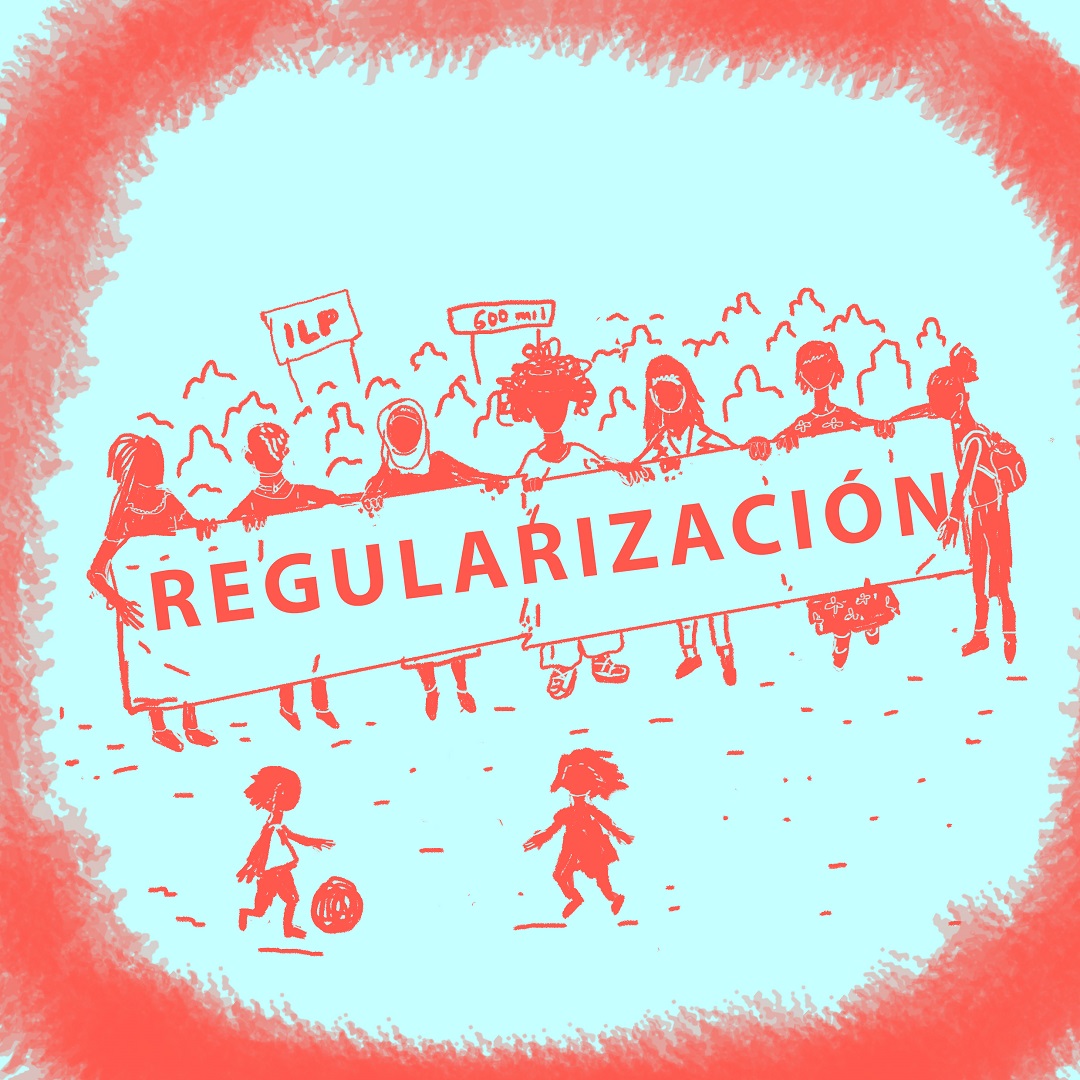
.jpg)
